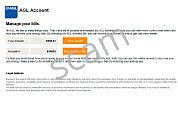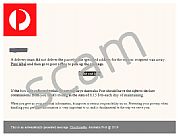News
Be Careful Where you Click
Email scams are rife and the authorities have no means of stopping them.
Remember the early days when we just received plain text emails from a widow in Nigeria who needed to put $25,000,000 in our bank account? Or winning millions in a lottery that you’ve never heard of? The scams were easy to spot.
Things are not so simple now.
AGL and Netflix have both been recent businesses, targeted by scammers masquerading as these legitimate businesses. Scam emails have been sent which look like AGL Energy accounts. And they really do look very like the original. However, if you click on the link to view your account, you’re in a world of trouble. Clicking on a link in a suspect email may result in malware (malicious software) being downloaded to your computer or device.
Within minutes all of your contact lists could be harvested, all of your files stolen, or your files could be locked and irretrievable. Emails, work documents, school assignments, and photos, all gone, never to be seen again. And, it’s suddenly time to buy a new computer.
Recently, Netflix users have been targeted via text message. The text message contains a link that will take you to a fake sign up page that looks quite legitimate. The user is asked to confirm all their details, which provides the criminals with all their credentials.
Australia Post has also been targeted with emails supposedly being sent from “Australia Post” about a parcel they tried to deliver. The sender email address says only “AusPost”, but upon looking at the details, it was actually from the hellwig-haustechnik.de domain. Not one that Australia Post would use.
These phishing emails will look like they come from an official source, but we need to be more savvy about who we trust. Does your bank really send out emails saying your account has been compromised? What are the chances of the message being legitimate? There are always other easy ways to find out if you’re looking at a scam, and it definitely does not include clicking on the link in front of you.
Hints and Tips:
- Always be suspicious about links and attachments that you are not expecting.
Certainly don’t open or visit suspect links and attachments. - Check the source.
The name may be familiar, but is the email address also familiar? - Check the link before you visit.
If you tap and hold the link (or hover the mouse pointer over it), you’ll most likely see the destination. Does it look legitimate? - Go directly to the service / organisation.
Rather than clicking or tapping on links, search for or directly navigate to their official website.
Now that the financial year has come to an end and we’re all looking forward to getting our tax returns done, we can also expect a surge in scam emails with a link to “Collect your Tax Refund”.
Online scams have become increasing sophisticated and are affecting everyone, from private individuals to large scale companies. We all need to keep an eye out and think before we click.
For more information on recent scams see: https://www.scamwatch.gov.au/
This article archived 1 Oct 2016
















